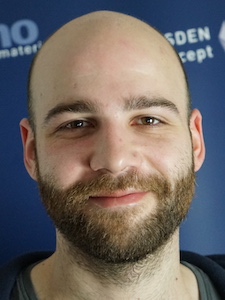


The development of new materials is a formidable task. In recent years, the advancement of theoretical methods and numerical algorithms, fueled by the ever increasing computing power, has led to an explosion of computational data and sparked the creation of open material repositories with millions of entries. The creation of such databases requires standardized, consistent and reproducible calculations, usually done via sophisticated workflows in a high-throughput manner. In this thesis, we developed such a workflow for two-dimensional covalent organic frameworks (COFs) with the goal of finding potential structure - property relations and create a database with our finding. COFs are a relatively new group of porous materials which can be synthesized via reticular chemistry in mono- or multilayers and in two- or three dimensions. They are composed of building blocks which can be linked in a Lego-like fashion, making them a highly versatile material by giving them huge combinatorial variety. Applying this workflow to 518 COFs, we calculated their two dimensional bulk- and shear modulus. Firstly, the importance of automatic handling of unwanted behaviours via certain filters was shown. Secondly, we found that the elastic moduli of 2D COFs are highly dependent on the lattice type and the relative size between their different building blocks. Lastly, we collected and visualized the data in a comprehensive and expandable database.
Jonathan studies Materials Science since 2013 at TU Dresden. He joined our group for his Internship and later for his Diploma thesis on "High throughput workflow for 2D COF property screening".



The development of new materials is a formidable task. In recent years, the advancement of theoretical methods and numerical algorithms, fueled by the ever increasing computing power, has led to an explosion of computational data and sparked the creation of open material repositories with millions of entries. The creation of such databases requires standardized, consistent and reproducible calculations, usually done via sophisticated workflows in a high-throughput manner. In this thesis, we developed such a workflow for two-dimensional covalent organic frameworks (COFs) with the goal of finding potential structure - property relations and create a database with our finding. COFs are a relatively new group of porous materials which can be synthesized via reticular chemistry in mono- or multilayers and in two- or three dimensions. They are composed of building blocks which can be linked in a Lego-like fashion, making them a highly versatile material by giving them huge combinatorial variety. Applying this workflow to 518 COFs, we calculated their two dimensional bulk- and shear modulus. Firstly, the importance of automatic handling of unwanted behaviours via certain filters was shown. Secondly, we found that the elastic moduli of 2D COFs are highly dependent on the lattice type and the relative size between their different building blocks. Lastly, we collected and visualized the data in a comprehensive and expandable database.
Jonathan studies Materials Science since 2013 at TU Dresden. He joined our group for his Internship and later for his Diploma thesis on "High throughput workflow for 2D COF property screening".